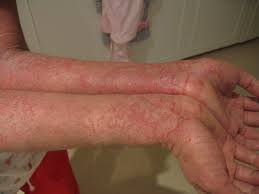Researchers are trying to discover why food allergies are on the rise in developed countries worldwide, and to learn more about the impact of the disease in developing nations.

An increasing number of Britons claim they are intolerant to wheat.
Health problems involving wheat fall into three main groups.
Gluten intolerance, otherwise known as coeliac disease, is an inflammatory condition of the digestive tract, caused by gluten, a protein found in wheat, rye, barley and oats. It is not a contagious illness but is often genetic. Coeliac disease affects one person in every thousand. Most people are diagnosed between the ages of 30 and 45. Classic symptoms include lethargy, weight loss, vomiting and diarrhoea.
A wheat allergy. A sensitivity or allergy to wheat can produce a variety of symptoms in the body such as sneezing itching, rashes, watery eyes, runny nose, coughing, hay fever, headaches, nausea, digestive problems, swollen limbs or general aches and pains. When someone is allergic to a certain food, their immune system reacts as if the food were an invader and produces antibodies.
Unlike classic allergies, if you are allergic to wheat you will usually be allergic to more than one food. On average, sufferers react to four or five different foods.
Sufferers are advised to eliminate wheat from their diet altogether and replace with rice, corn, millet, buckwheat or potatoes.
Wheat intolerance does not involve an immune response. The reasons why people suffer from wheat intolerance are not entirely understood. Some experts believe it occurs when some people are short of the enzymes necessary for the proper digestion of wheat. Symptoms of wheat intolerance can include bloating, headaches and joint pains. Some people find pasta and bread hard to digest. This is because the food absorbs water, so it swells in the body and causes discomfort. Many jump on the bandwagon and assume they're wheat intolerant.

What Causes Allergies? The Role of Antibodies:
The immune system is similar to a sensory system in that it is aware of the environment and adapts. Its purpose is to recognize foreign invaders, such as bacteria and parasites, and launch an attack to counteract the threat of infection. It also recognizes and disposes of ill or defective internal cells, to prevent a disease from spreading. Wow!
The immune system must recognize and separate what is foreign or abnormal from what is normal. A complex process produces millions of unique antibodies which serve as recognition agents that can trigger an immune response. Sounds like a robot!
Food allergy and food intolerance are quite different things. A food allergy is a reaction produced by the body’s immune system when it encounters a normally harmless substance. An intolerance does not usually involve the immune system. When a foodstuff (such as wheat) causes an unpleasant reaction (such as a rash), the effects are slow. People who have allergies will have a bad reaction even if they come into contact with a very small amount of the foodstuff they are allergic to, whereas those with an intolerance may still be able to eat that foodstuff in small quantities.
The foods people can become allergic to include: celery, cereals containing gluten (including wheat, rye, barley and oats), crustaceans (including crabs and prawns), eggs, fish, lupin, milk, molluscs (such as mussels and oysters), mustard, nuts (including brazil nuts, hazelnuts, almonds and walnuts), peanuts (groundnuts or monkey nuts), sesame seeds, soya.
I'm one of the lucky (healthy) ones. No allergies for me. As a child living in Australia in the 40s, I played in the street, or the dirt in the back yard, legs exposed to the environment. When I fell off my bike and grazed my knees, thick scabs formed that took weeks to heal. I ate anything put in front of me, and tasted all sorts of weeds. Maybe it's beneficial for a young body to get down in the dirt and eat a variety of foods. Perhaps modern children living in developed countries are too removed from the environment.





 RSS Feed
RSS Feed
